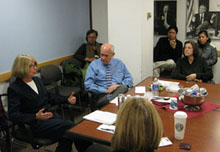
October 14, 2008 — The title of Lynn Sweet’s talk at the Shorenstein Center was “The 2008 Road to the White House,” and what a road it’s been.
“You have two unlikely candidates who have taken this route to the White House,” said Sweet, a columnist and Washington Bureau Chief of the Chicago Sun-Times. “Who would have thought that John McCain could come back as many times as he came back to be where he is today? Who would have thought that a little-known senator could be in the position he is?” And no matter who wins, the result will be historic: We’ll elect either the oldest president ever and the first female vice president on one ticket, or the first African-American president ever on the other.
A former fellow at the Institute of Politics, Sweet has been focused on covering Barack Obama since his 2004 victory in the Illinois primary that led to his election to the Senate. “Instead of winning just a plurality in a crowded race, he won a majority. That was the first signal that there was something extraordinary going on.”
And according to Sweet, something extraordinary is still going on. “Why is it that campaign came to where it is right now, poised to win the White House?” Some of it is because of external events — Sweet called the Obama campaign “lucky” at one point — but much of it was part of the plan. “From day one, they knew what they wanted to be about: They wanted to be about change. They wanted to be about hope. They wanted this to be generational. They wanted it to be aspirational. And they were going to organize the heck out of the nation.”
Sweet said Obama’s campaign was notable for its “steadiness,” and also the understanding that politics has changed. “The most important decision that Obamba made [was that] he realized that while experience remains an issue to this day, if he’d had more of it, it might not have helped.” Why? Because with every additional year in the Senate, Obama would have had that many more votes that could have been used against him, that many more people he might have made angry. “I think they realized early on that experience isn’t what it used to be. Go figure.”
Another significant development Sweet pointed to was the “explosion” of political blogs that occurred around the time of the Democratic primary contest between Obama and Hilary Clinton. Likening blogs to mimeograph machines — the remark got laughs from most of the crowd, and puzzled looks from a few of the younger attendees — Sweet said that they had turned reporters into “minute-by-minute wire services.”
As a reporter, she said she now has a choice of three outlets for anything she produces: television, her print column, and her blog. Which one she’s reporting for changes what kind of access she gets — and how quickly. And after television, it’s a request for a quote for a blog that gets the most attention.
“This cycle has a lot of fast paced, never ending, relentless amount of news,” Sweet said. “I sleep with my Blackberry next to me.” But when it came to highlighting the most important piece of technology in modern campaign, that ubiquitous PDA didn’t make the cut. Instead, it was the broad-band access card, which allows reporters to be online anywhere. What she isn’t a fan of is doing live chats during debates. “When McCain referred to Obama as ‘that one,’ I didn’t even notice that.”
Blogging not only accelerated the news cycle and Sweet’s life, but also changed how she thinks about reporting. Back in the print-only days, she said, she never would have acknowledged another paper if she didn’t have to. Now, in her blog, she’s happy to. “If somebody has a good story that will get me hits on my blog, I think far more as a businessperson,” something that overrides any feelings of competitiveness.
During the question-and-answer session, Sweet returned to the election itself, including what she saw as a rare instance of the Obama campaign’s being caught off guard: McCain’s pick of Sarah Palin as his running mate. “They were thinking conventionally,” Sweet said of the Obama campaign. “The conventional thinking is, ‘How can you pick someone with no experience who has an ethics problem back home?’ … so they thought, ‘Who would ever pick her?’ The McCain campaign meanwhile was looking at her debate tapes, and knew that she had her own charismatic shtick — I think that’s the technical word — and they saw this as someone who could put more sizzle on the steak.”
This article was written by and the photos taken by Leighton Walter Kille of the Shorenstein Center.

